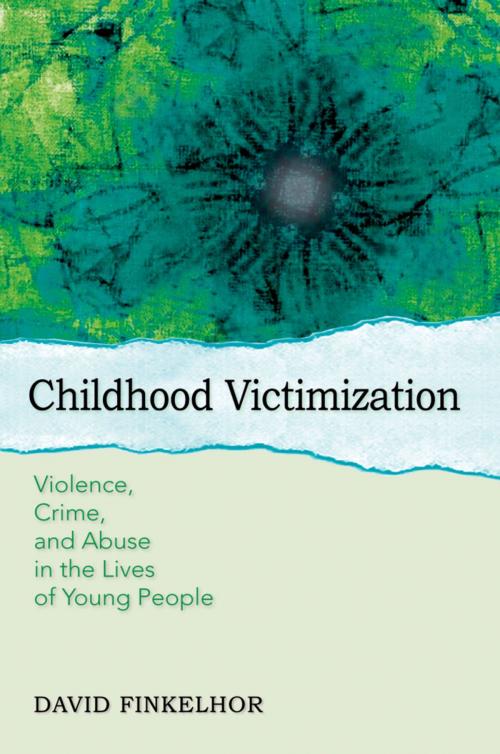Childhood Victimization
Violence, Crime, and Abuse in the Lives of Young People
Nonfiction, Health & Well Being, Psychology, Pathological Psychology, Social & Cultural Studies, Social Science, Social Work| Author: | David Finkelhor | ISBN: | 9780190451066 |
| Publisher: | Oxford University Press | Publication: | March 10, 2008 |
| Imprint: | Oxford University Press | Language: | English |
| Author: | David Finkelhor |
| ISBN: | 9780190451066 |
| Publisher: | Oxford University Press |
| Publication: | March 10, 2008 |
| Imprint: | Oxford University Press |
| Language: | English |
Children are the most criminally victimized segment of the population, and a substantial number face multiple, serious "poly-victimizations" during a single year. And despite the fact that the priority emphasis in academic research and government policy has traditionally gone to studying juvenile delinquents, children actually appear before authorities more frequently as victims than as offenders. But at the same time, the media and many advocates have failed to note the good news: rates of sexual abuse, child homicide, and many other forms of victimization declined dramatically after the mid-1990s, and some terribly feared forms of child victimization, like stereotypical stranger abduction, are remarkably uncommon. The considerable ignorance about the realities of child victimization can be chalked up to a field that is fragmented, understudied, and subjected to political demagoguery. In this persuasive book, David Finkelhor presents a comprehensive new vision to encompass the prevention, treatment, and study of juvenile victims, unifying conventional subdivisions like child molestation, child abuse, bullying, and exposure to community violence. Developmental victimology, his term for this integrated perspective, looks at child victimization across childhood's span and yields fascinating insights about how to categorize juvenile victimizations, how to think about risk and impact, and how victimization patterns change over the course of development. The book also provides a valuable new model of society's response to child victimization - what Finkelhor calls the Juvenile Victim Justice System - and a fresh way of thinking about barriers that victims and their families encounter when seeking help. These models will be very useful to anyone seeking to improve the way we try to help child victims. Crimes against children still happen far too often, but by proposing a new framework for thinking about the issue, Childhood Victimization opens a promising door to reducing its frequency and improving the response. Professionals, policymakers, and child advocates will find this paradigm-shifting book to be a valuable addition to their shelves.
Children are the most criminally victimized segment of the population, and a substantial number face multiple, serious "poly-victimizations" during a single year. And despite the fact that the priority emphasis in academic research and government policy has traditionally gone to studying juvenile delinquents, children actually appear before authorities more frequently as victims than as offenders. But at the same time, the media and many advocates have failed to note the good news: rates of sexual abuse, child homicide, and many other forms of victimization declined dramatically after the mid-1990s, and some terribly feared forms of child victimization, like stereotypical stranger abduction, are remarkably uncommon. The considerable ignorance about the realities of child victimization can be chalked up to a field that is fragmented, understudied, and subjected to political demagoguery. In this persuasive book, David Finkelhor presents a comprehensive new vision to encompass the prevention, treatment, and study of juvenile victims, unifying conventional subdivisions like child molestation, child abuse, bullying, and exposure to community violence. Developmental victimology, his term for this integrated perspective, looks at child victimization across childhood's span and yields fascinating insights about how to categorize juvenile victimizations, how to think about risk and impact, and how victimization patterns change over the course of development. The book also provides a valuable new model of society's response to child victimization - what Finkelhor calls the Juvenile Victim Justice System - and a fresh way of thinking about barriers that victims and their families encounter when seeking help. These models will be very useful to anyone seeking to improve the way we try to help child victims. Crimes against children still happen far too often, but by proposing a new framework for thinking about the issue, Childhood Victimization opens a promising door to reducing its frequency and improving the response. Professionals, policymakers, and child advocates will find this paradigm-shifting book to be a valuable addition to their shelves.















